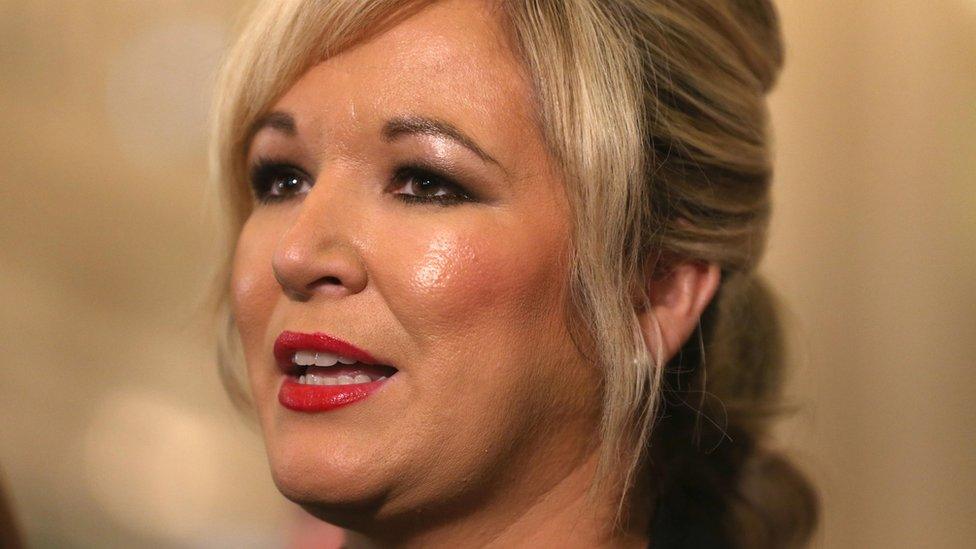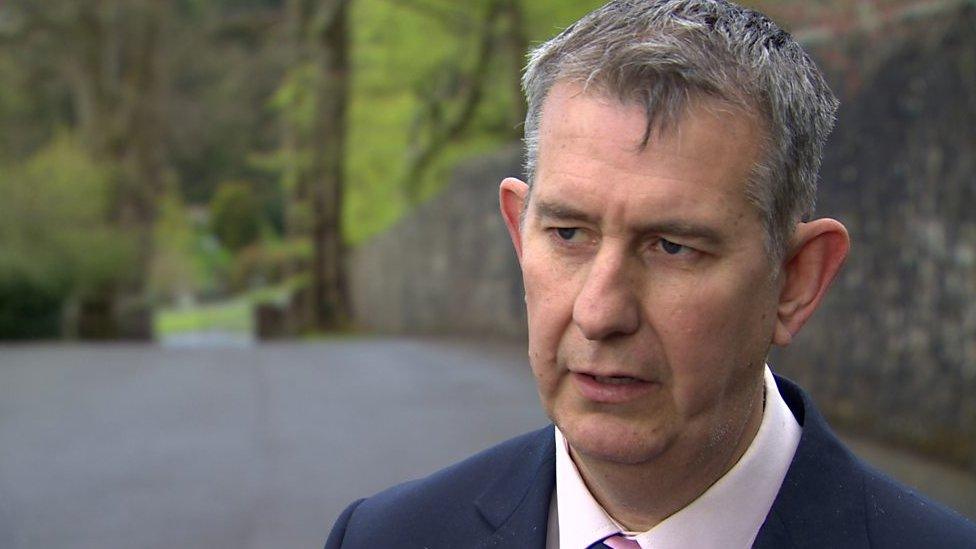Coronavirus: No major relaxation of lockdown, says O'Neill
- Published
- comments

Michelle O'Neill warns relaxation of lockdown measures will be "gradual and slow"
Deputy First Minister Michelle O'Neill has warned people not to expect major change when lockdown rules are reviewed next week.
Ms O'Neill said any changes to Covid-19 restrictions would be "gradual and slow".
She said she hoped that there could be a joined-up executive agreement "we can stand over because the science tells us that we can stand over it".
Ms O'Neill was speaking on BBC Northern Ireland's The View on Thursday evening.
She made the comments after Environment Minister Edwin Poots suggested that churches should be able to open if they could practise social distancing.
He said people had got the message on the continued need for social distancing, and NI had "put coronavirus into reverse".
If off-licences could be trusted to stay open, churches could too, he said.
Ms O'Neill told The View she believed Mr Poots's comments were "unhelpful".
Stressing there would be no "quick fix", she said: "We're going to have to work our way through it as best as we can."

Edwin Poots said there should be a graduated response to lifting lockdown restrictions
'Life after lockdown'
Earlier, Health Minister Robin Swann said Northern Ireland had not yet reached the point where restrictions could be lifted.
He said the executive needed to make sure it does not send out "wrong signals" about the lockdown.
Nine new Covid-related deaths were announced by Stormont's Department of Health on Thursday, bringing its total to 347. That toll relates mainly to hospital fatalities and is likely to rise when community deaths are taken into account.
Across the UK, 26,711 have now died - an increase of 674 from Wednesday, while another 43 deaths were confirmed in the Republic of Ireland bringing the total there to 1,232. However both countries used different counting methods.
Speaking at the daily Stormont press conference, Mr Swann warned that social distancing could be in place in Northern Ireland for "months or even years".
"There is pressure on those of us in leadership to chart a way forward, to reassure people there will be a life after lockdown.
"But we also need to make sure we don't send out the wrong signals, and give the impression restrictions will be eased any time soon."

In other developments on Thursday:
Universities in Northern Ireland face multi-million-pound losses due to the coronavirus pandemic
Some schools face losing thousands of pounds paid for trips cancelled
A doctor, who left medicine for the clergy, is now back on the wards
A joint UK and EU committee focused on how to implement the Northern Ireland part of the Brexit deal held its first meeting on Thursday

NI's Chief Scientific Adviser, Prof Ian Young, said while evidence suggested the number of new Covid-19 cases was falling slowly, the current restrictions need to remain in place.
"Looking at the data around traffic usage in recent days would suggest adherence is declining.
"I would ask people to reflect on that and understand the importance of our commitment to the current measures."
Mr Swann revealed that Northern Ireland recorded its highest daily testing rate for Covid-19 on Wednesday, testing 2,243 people.
He also outlined more plans for a system to trace people who had been in contact with those confirmed to have the virus.
As many as 300 people will be employed in the pilot scheme, which will work closely with the authorities in the Republic of Ireland to counter any sudden outbreaks along the border, he added.
Executive infighting
The pandemic has caused major disruption to religious services across Northern Ireland, with many churches severely restricting funeral services or cancelling them altogether.
Council-run cemeteries were recently reopened to the public, after an initial disagreement between the parties in the executive.
Mr Poots said he was not recommending the return of church services as yet, but suggested people could visit places of worship individually or in small family groups.
"There's no reason whatsoever that that cannot be supervised," the DUP MLA told the BBC's Nolan Show.
Guided by science?
Among clerics, reaction has been mixed.
Reverend Kyle Paisley, a minister in the Free Presbyterian Church, said keeping churches closed during the pandemic was "a bitter pill to swallow".
Pews were empty at Easter due to the lockdown so some services went online
But he accepted the measures were in place for health reasons, adding that God could be prayed to and talked about, whether online or at home.
Any decision needed to be guided by scientific advice, said Fr Eddie McGee, the communications officer for Down and Connor Diocese.
Parishioners should not expect churches to run to a pre-pandemic schedule when they do reopen, he told BBC Radio Ulster's Talkback programme.

A SIMPLE GUIDE: How do I protect myself?
AVOIDING CONTACT: The rules on self-isolation and exercise
LOOK-UP TOOL: Check cases in your area
MAPS AND CHARTS: Visual guide to the outbreak

- Published29 April 2020
